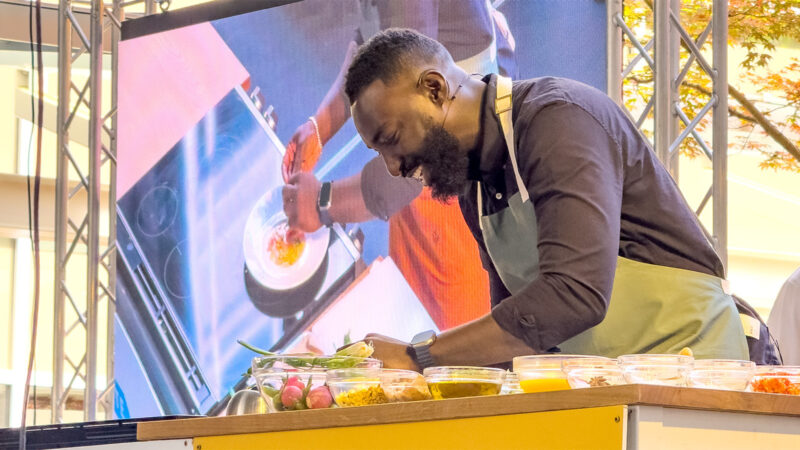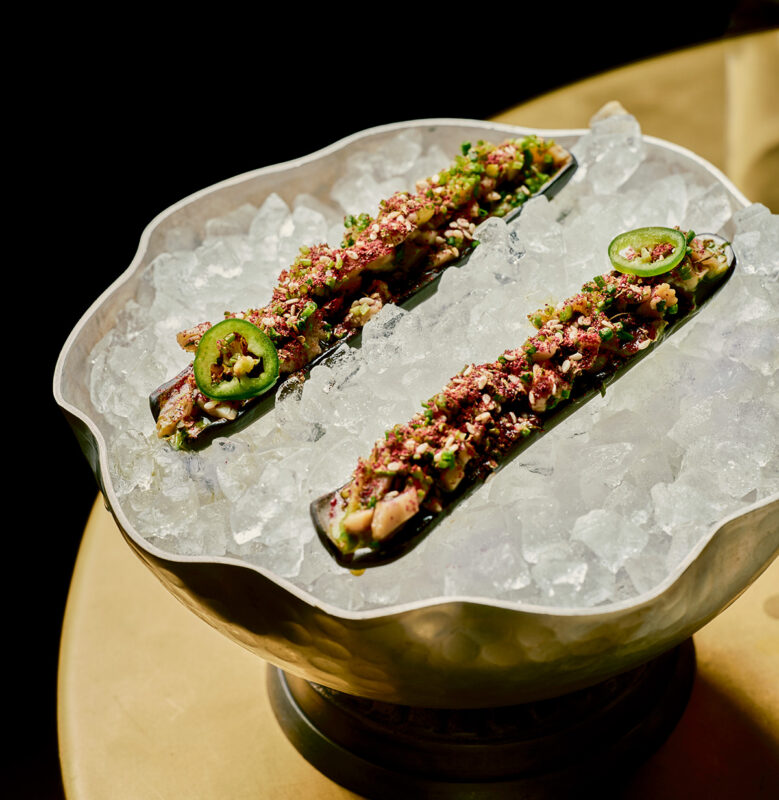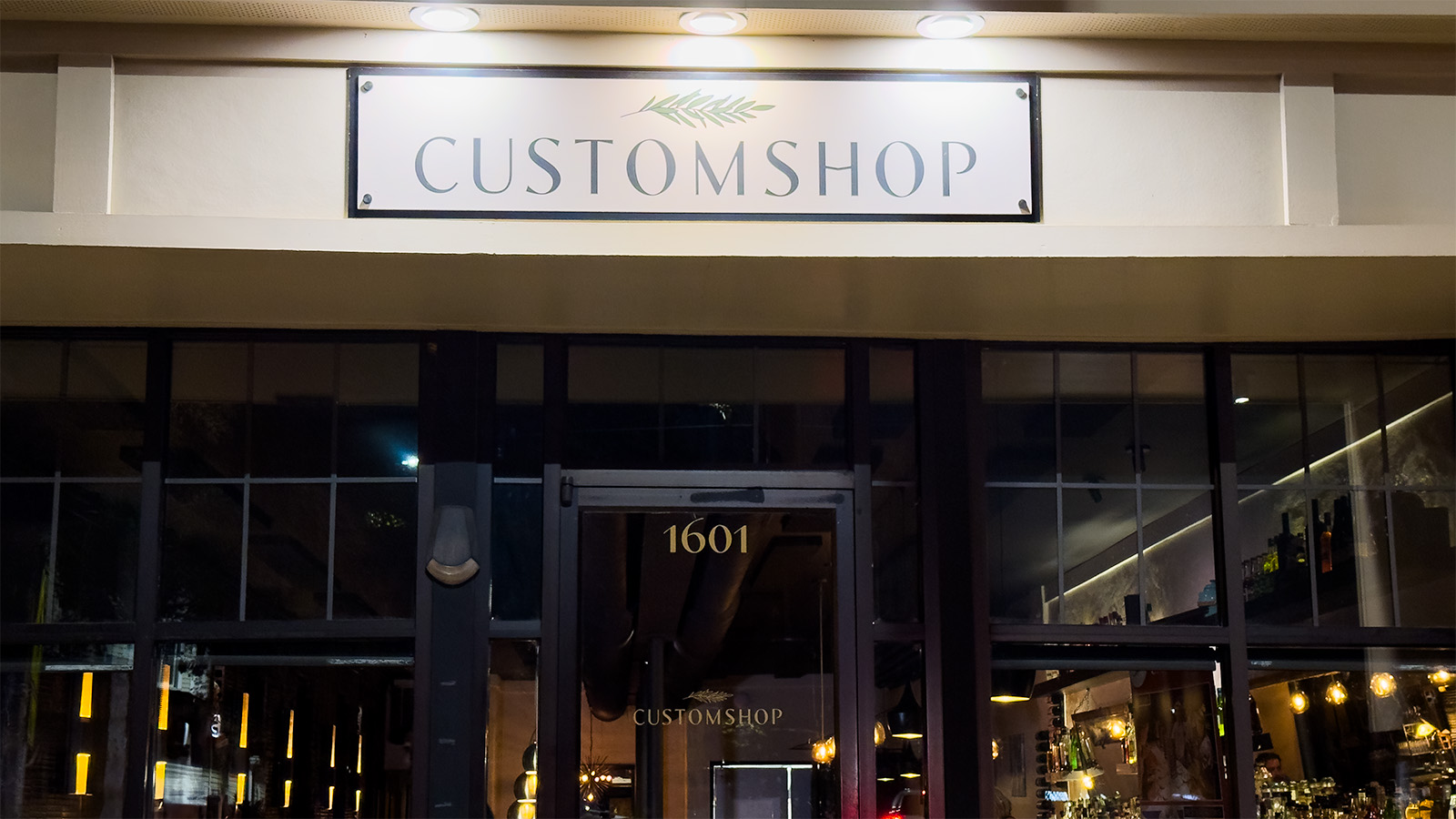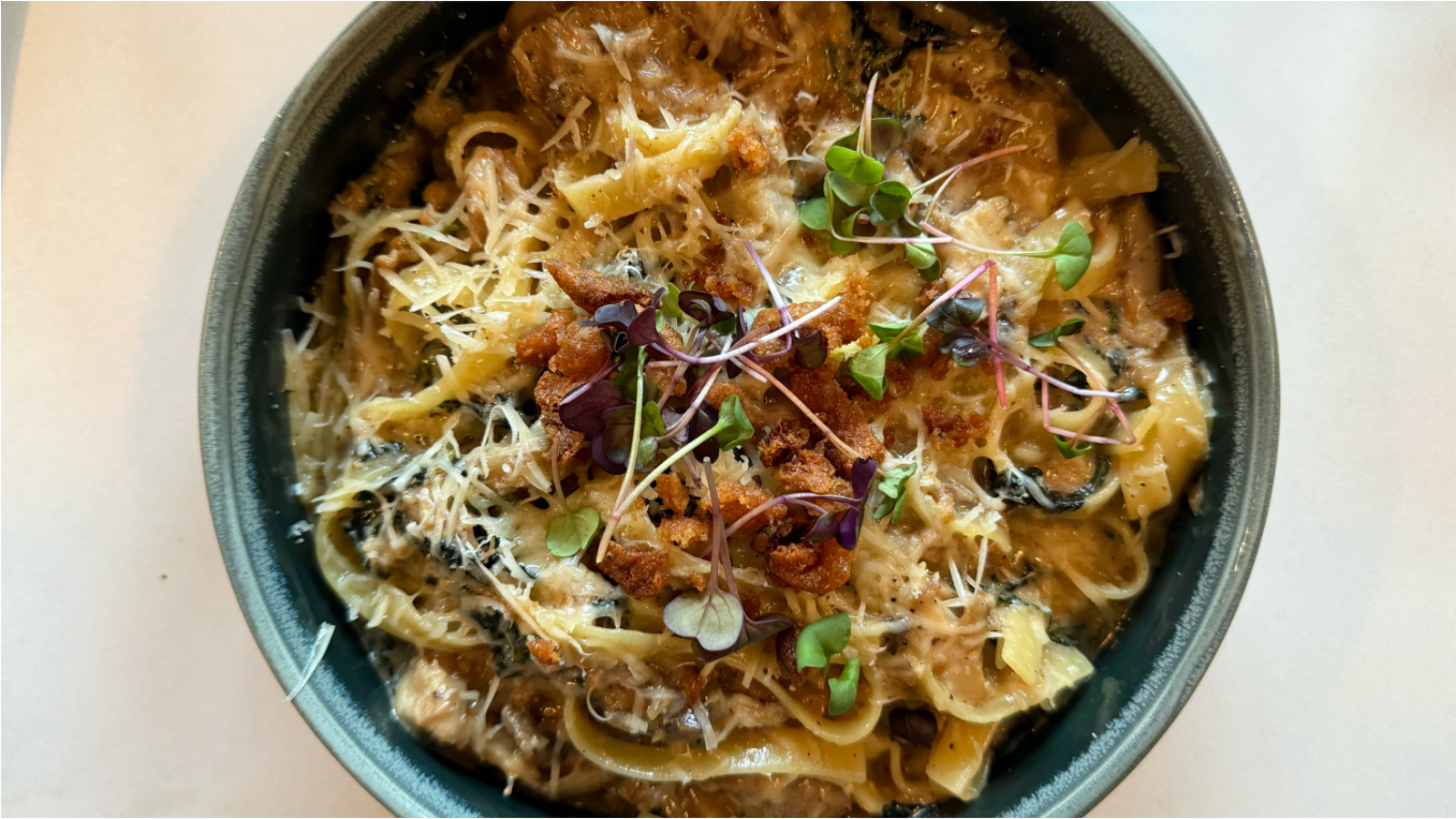
Editor's Note: This story is unlocked for everyone to read courtesy of the CRVA, our partner in nourishing culinary exploration for residents and visitors of the Queen City.
April 29, 2025
Chef Eric Adjepong on his best bites in Charlotte and the city’s culinary scene
“It definitely needs to be a place that is shouted out on the highest mountain tops,” the TV personality and restaurateur says
by Kristen Wile

Each year, the Charlotte StrEATs Festival brings in a celebrity chef guest to share their skills during a cooking demonstration and meet-and-greet with festival attendees. One of our favorite parts of hosting these chefs, though, is showing off our city’s food scene to them. This year’s guest, chef Eric Adjepong, is known for both his TV work on Top Chef and Wildcard Kitchen as well as his highly anticipated restaurant Elmina in D.C. After visiting the StrEATs Festival for his demo and chatting with guests, Adjepong enjoyed a Charlotte culinary tour featuring Mazi, Albertine, and Supperland.
“We had some really, really good eats — I can’t stop thinking about Supperland,” Adjepong says. “The food was incredible, the drinks were really, really tasty — just craftsmanship throughout the chefs, throughout the mixologists and bartenders, throughout the restaurateurs, and people trying to make the hospitality scene really unique.”
Here, he shares his thoughts on Charlotte’s culinary style, whether we deserve a James Beard Award, and the best things he ate here.
Unpretentious Palate: What were your big takeaways from Charlotte as a city during your time here?
Eric Adjepong: Charlotte as a city, I think, holds its own with every major metropolitan city in the States. I’ve traveled a bunch; I know you have as well. It is bustling, there’s a lot of different culture there. There’s its own unique culture as well, and there’s a quaintness that I really enjoy. I think as much as of a city as it is — and it very much is — is there’s also a hometown feel that’s very unique. Being in D.C., maybe there’s a little bit of that, but I felt it the most while in Charlotte. Obviously having you to help steer things around and chauffeur and be a tour guide, you did an awesome job and I met so many people. I think another thing that I really loved was a point that you made earlier — the random connections of family and friends and people that I’ve worked with and colleagues that I really, really enjoyed. I think that was my favorite part, honestly — just bumping into old colleagues, old friends, fraternity brothers, and it’s just like, whoa, if I moved to Charlotte tomorrow, never having lived there, I feel like I would make a very, very quick connection with folks. I would have a nucleus really, really quickly, because of so many great random, but very meaningful, connections that I really, really enjoyed. I think that was definitely my favorite part outside of the food being amazing.
UP: What did you know about Charlotte’s food scene coming into it and what did you leave thinking?
EA: You know what, my ignorance of the Charlotte food scene was high. I knew of a few chefs who do Top Chef. [Charlottean and Pack Your Knives podcast co-host] Tom Haberstroh is obviously a person I talk to every day; he always mentions where he eats and places he goes, but I haven’t been in Charlotte to really get a full download on the food scene. So I was going in happily ignorant, just willing to sort of absorb and again download what’s happening in the scene. It’s always cool for me as someone in the industry to get out of my four walls, so to speak, in D.C. and in New York, and L.A. and to get into something completely new. When I left, I was very, very, very happy.
I guess the best analogy is when you hear that indie band or underground group, and then all of a sudden like everybody else listens to the same music and you’re just like, ‘Oh no, no, no, no, this is my group, this is for me.’ I kind of felt that: I want to keep Charlotte my own little spot, but it definitely needs to be a place that is shouted out on the highest mountain tops, the food, and again the craftsmanship behind what a lot of people are doing there, and the energy that people are bringing is so profound. It brings a lot of unique takes to a food scene that I think definitely needs to be praised a lot more publicly, and I’m glad that it is happening, that Michelin is coming down and James Beard hopefully can shake things up as well. That’s very exciting because Charlotte absolutely deserves it.
UP: If somebody who hasn’t been here before asked you to describe Charlotte’s culinary style and food scene, what would you say?
EA: I would say that it’s innovative. It’s Southern, but it’s not what your classic thought of Southern food is. I think there are traces of the flavor profiles that are definitely there. It’s absolutely ingredient-driven, and that’s what I love too, again, going back to Supperland and getting those sweet potatoes and those beets, and letting the ingredient speak for itself. I think the soil, the air, the water, that whole combination, and obviously great farmers and chefs and people who know what they’re doing, add a very unique palate to the food and the ingredients that you can’t find anywhere else. Just being there with that sort of great produce and bountifulness that Charlotte has, it’s so, so unique. Usually, we’re getting stuff from that area. It’s being shipped all over. But when you’re there in ground zero, you’re getting the best of the best at the best time. The seasons are at their peak all the time, and to have that in your back pocket as a chef, man, that’s so cool. I definitely love the ingredients and again the use of the combinations of it all. It’s so Charlotte to me and I love that about it.

UP: Can you tell me about some of the dishes you had that were memorable while you were here, some of the things that stick in your mind?
EA: Oh, those beets [at Supperland] again, the confit onions, the sweet potatoes, some of those really delicious oysters; the razor clams that we had [at Albertine] were absolutely amazing. But every single time, it’s really the seafood and the produce. [Albertine’s] zaalouk with the eggplant was delicious. Having all those beautiful dips and the pomegranate [at Mazi]. It was just flavor bombs on flavor bombs on flavor bombs. Typically I would think, and maybe this is just an archaic sort of thought, it’s heavy protein and barbecue slathered everywhere, but no, it was the produce to me that was shining and so well driven as far as the dishes were concerned. Not a lot of things need to be done to it, right? Just a few accents, a few accouterments around it, but really let the ingredient itself — the produce, again, the eggplant, the onion, the beets, the hummus — let that be the star and just give things to dip and rip and pass around. A few pickles here, a few drops of this there, and then you really have a very delicious plate of food.
UP: Was there anything that you tasted that you’re taking back as inspiration for Elmina?
EA: I haven’t stopped thinking about those clams that we had, the razor clams [at Albertine]. I thought that was absolutely delicious with the hot sauce. I loved the presentation as well [with the ceramic razor clam shell], and that’s another thing too, getting the entire ecosystem that makes a restaurant move, getting a local person to make the razor clamshells and have that sort of business be helped out by another business, I thought that was so, so, so cool. I’d love to implement that and look for people locally to help with what we’re doing at Elmina. The bacon fat tapioca maltodextrin on the beets [at Supperland] was really, really sharp.
UP: Charlotte, as a smaller metropolitan, is always comparing itself to bigger cities like New York. Should we be?
EA: You know, I don’t think so. I think you should stand tall on what you’re doing and when you build it they will come. It’s really a food scene that doesn’t need to be compared because you can’t compare it. New York is its own beast. It has its own ups and downs. There’s so much that is different with Charlotte that I think needs to be self-identified and self-celebrated and really plant that flag and and do it proudly. I don’t think you need to have a big brother, little brother sort of mentality of a big city and we’re trying to compare whatever. No, what you guys are doing in Charlotte specifically is so unique and again, if you build it they will come; I think people would — I know, rather — people will come to Charlotte specifically for the Charlotte food scene. I think having that pride in what the community is doing at large is the calling card that Charlotte should stand firm on.
UP: Another thing that we’re kind of chip on our shoulder about is we still don’t have any James Beard Award winners. You hosted the Awards. How much longer do you think we have to wait before we get one? Are we close?
EA: 100 percent. When I did the Awards and I hosted, I’d eaten at a good amount of those places to prepare, and the food is, if not better, it’s extremely comparable. It’s on that line. It’s going toe-to-toe with the nominees and the winners and all of the above. I think, again, if you keep just doing what you’re doing, and keep your head down, eventually, when you look up, then the crowd will be there.
This is an analogy I use at the restaurant every single day: We’re trying to chop down a big tree, a massive tree. We go in the middle of the woods. There’s the biggest oak tree that’s been there for hundreds and hundreds and hundreds of years. Our goal, our mission, is to chop it down, but we only have one swing at the axe every single day. We know that with one swing, one axe, one day, it’s not going to come down, but if we keep being diligent and hit the same spot the next day and the next day, eventually that tree will come down. And when it does, it’s going to make the loudest thud that it’s gonna be heard like a rippling effect all across the nation.
I’m going to use the same analogy for Charlotte. I think it’s just chefs and mixologists and restaurateurs and everyone else in that ecosystem taking that axe, one swing a day, really hard — doing the best you can, putting in those hours, attention to detail, the quality of the food, all of that, in that one swing, and then dropping it and then coming back the next day to do it again and then again and again. That thud would be absolutely heard. What’s crazy enough is I think that tree is falling down a lot sooner than I think folks in Charlotte realize. It’s really not up to you when and how it falls, but it’s really up to you in how you swing and how much energy you put behind it, and where exactly you’re hitting it. If you stay focused on those things, the rest will take care of itself.
UP: You met some Johnson & Wales students working as culinary helpers at the Charlotte StrEATs Festival. What advice would you offer to students regarding how to become successful in today’s changing restaurant world?
EA: Study the craft. That’s really the same answer that I got, and the same response that I’ll give to students now. Study the craft. Know what a sear is and a braise is and how to poach and what temperatures your meat and your protein should be at; understand exactly what you’re doing 100 percent, to the T. This goes with any sort of creative endeavor, even journalism and writing or photography or painting. A photographer studies the camera and knows the aperture and the F stop and how to work all those things to the T. With writing, there’s a system of checking and fact-checking and cross-checking and making sure that you’re really getting the most authentic story and editing yourself as well.
When you do those things in repetition, over and over and over again, and you know the craft so well, that’s when the creativity, that’s when the jazz, so to speak, starts to come in. You can play a little jazz with it because now you can bend a little bit of the craftsmanship. You can add in your culture, you can add in your background, you can add in where you’re from, and that in and of itself makes you completely unique. I think a lot of chefs when they’re young — I was one of those people — think they’re going to be the next you name it: Bobby Flay, Gordon Ramsey, this, that, and the third, right? But those chefs, they studied. They studied the ABCs, the 123s of cookery, and at that point, they started adding in their own spin. It’ll happen naturally. Again, those 10,000 hours, that axe and that tree, when you put in that work, you’ll be surprised how your creativity starts to come into play. I would encourage every student, in any sort of creative endeavor, to study what you’re doing like it’s the back of your hand. When you have that and you can do it with confidence — almost with your eyes closed — then you can start making a serious impact and start separating yourself from the pack.
UP: Charlotte’s had an influx of chefs coming to open restaurants here. Did we convince you to become one of them?
EA: You know what? I’ve got a lot of stuff on my plate, but I would not be mad owning a home and a restaurant or being involved in a space in Charlotte. I would absolutely not. I think it would be so cool. I can see myself there. I can see myself absolutely owning a spot there. I think there’s a lot of room for what I’m doing. I’d be excited just to even work with the produce in of itself like, shoot, I’ll do like an all-vegetarian sort of plant-based restaurant. I have so many different ideas I feel like that can work really well specifically in Charlotte that couldn’t work anywhere else. I would be honored honestly to do something there once I catch my breath. I just moved and obviously opening up, Elmina and everything else over here, but I would be absolutely honored if there’s someone who wants to set that up and partner up. Let’s talk. 100 percent.











